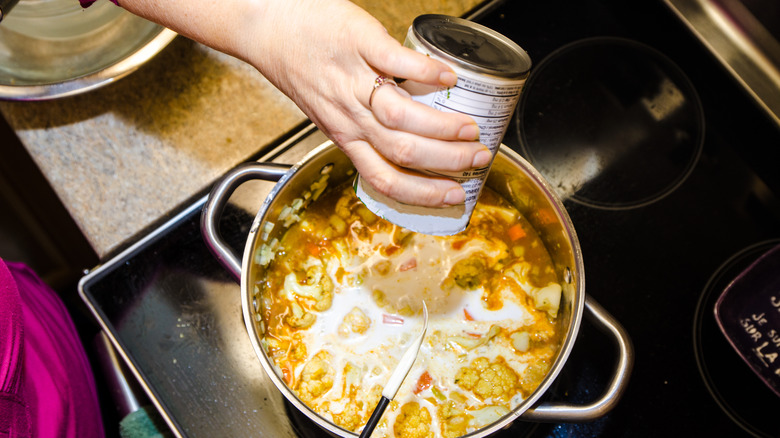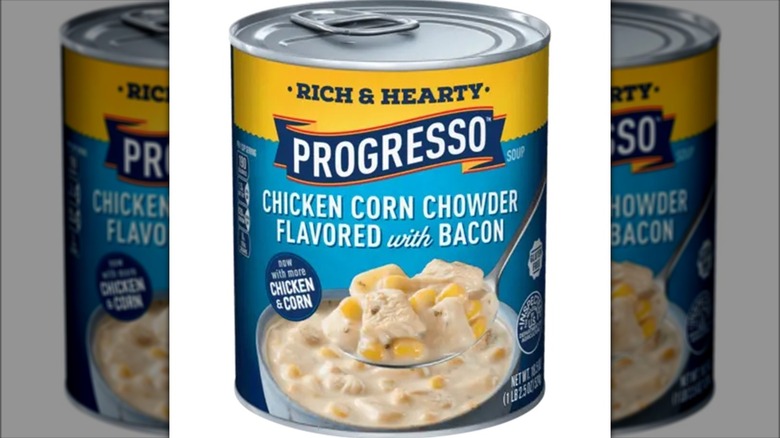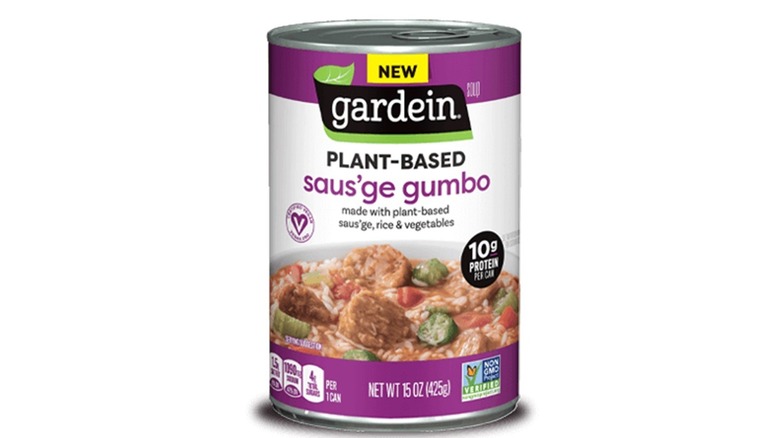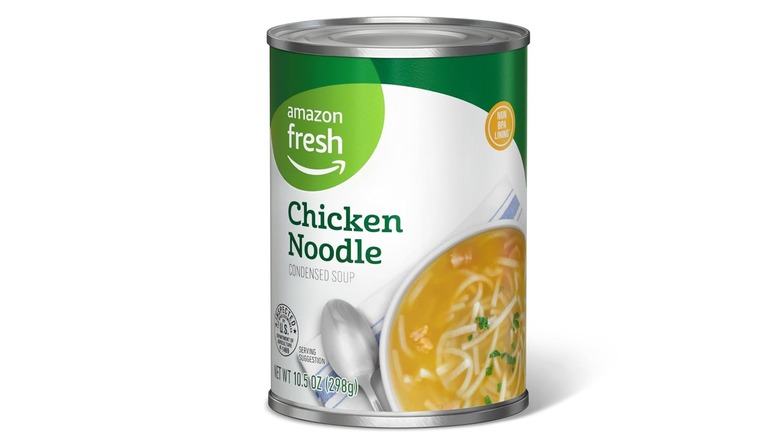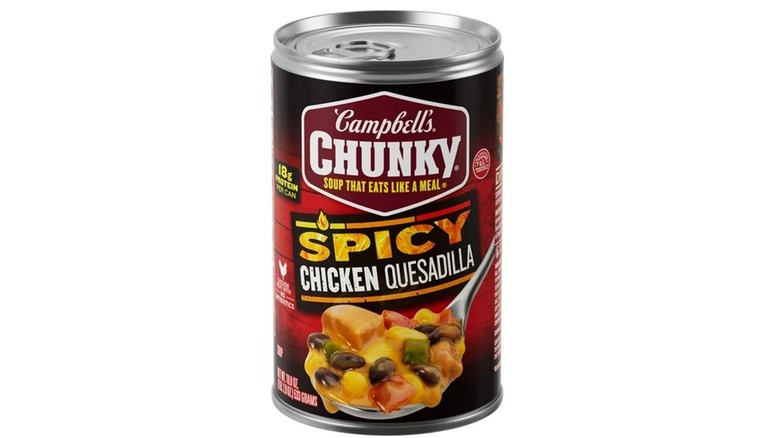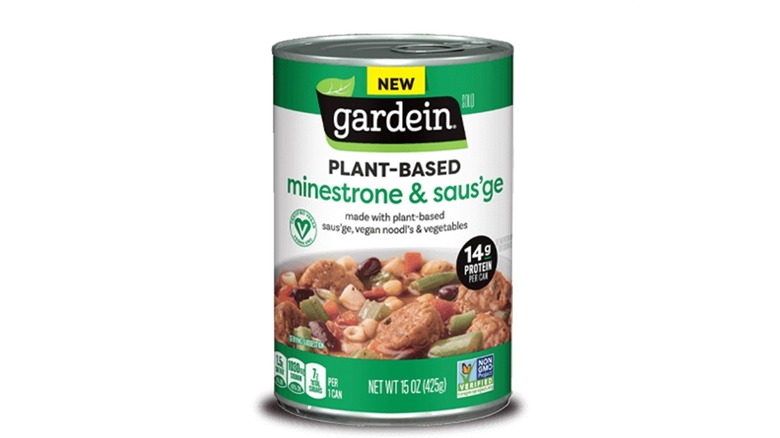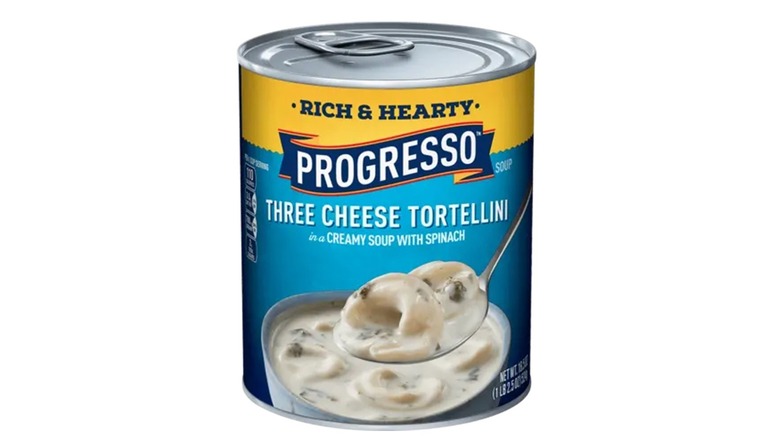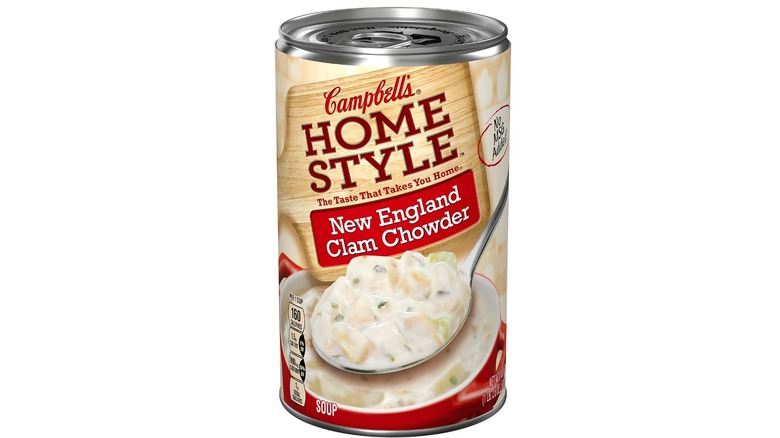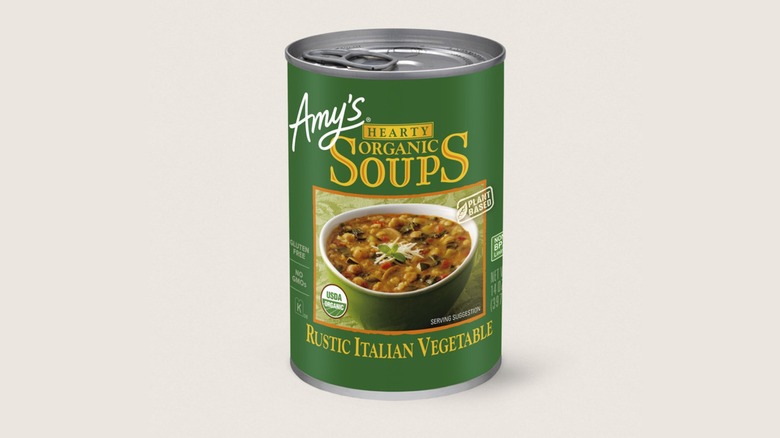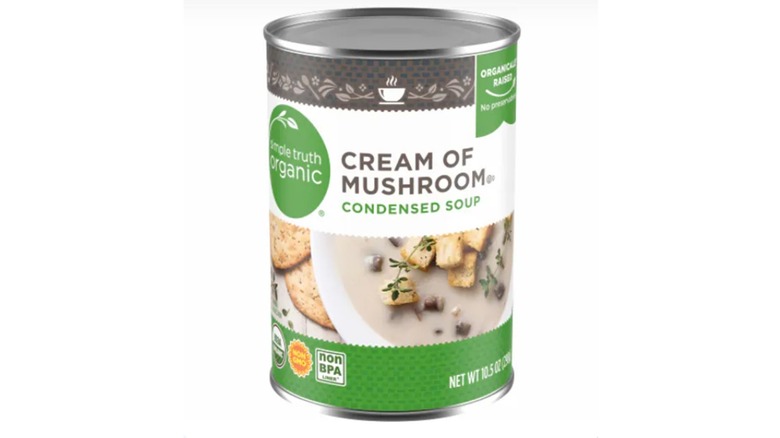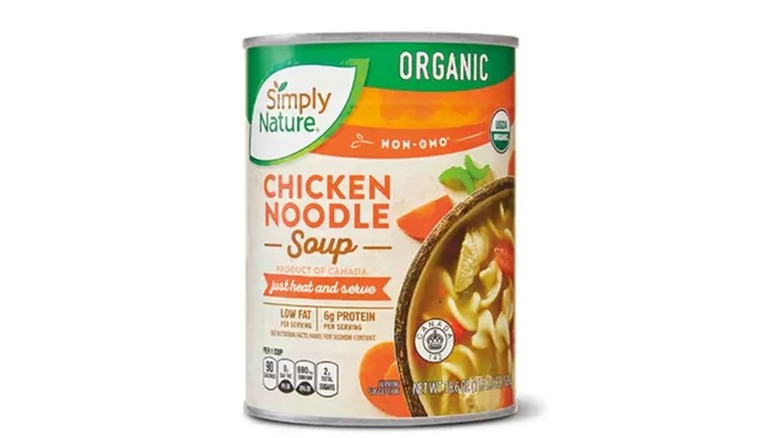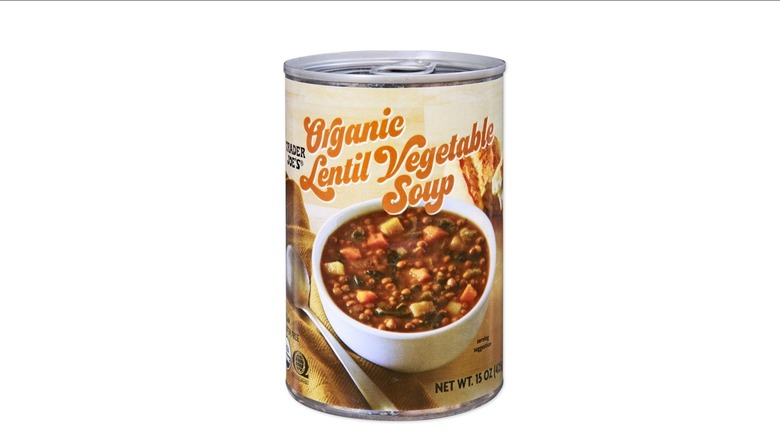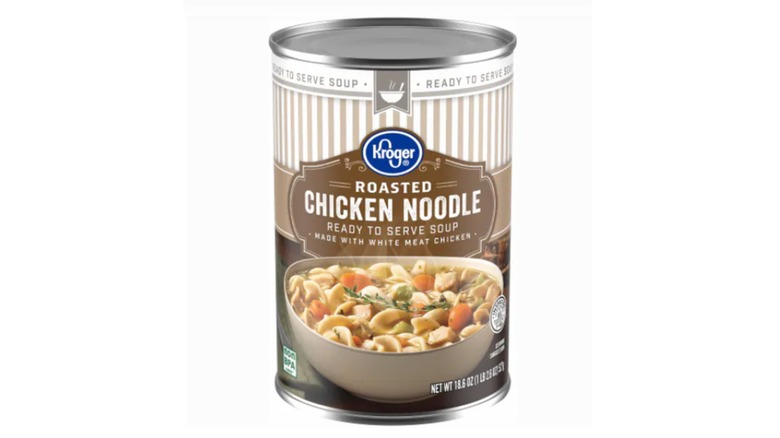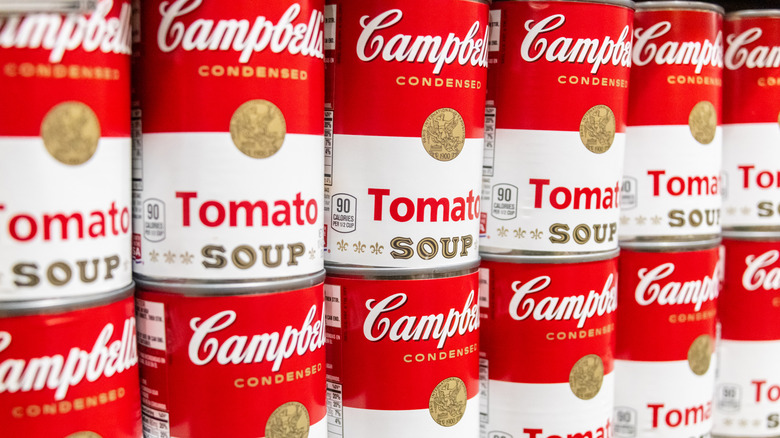The 12 Unhealthiest Canned Soups
We may receive a commission on purchases made from links.
The idea of having a warm bowl of soup may be a comforting prospect when cold weather takes over, but it isn't always a healthy one, especially if you're trying to avoid making mistakes with homemade soup by heating up soup from a can instead. Canned soup is notorious for its outrageous sodium count, and some of the richer recipes come with a high calorie and fat count as well. What's meant to be a meal that soothes can sometimes end up becoming an obstacle to healthy eating. Obviously, not all soups are created equally, which means some cans are less nutritious than others. Getting a clear picture of how the contents of the can may impact your well-being is the best way to make sure you can identify the unhealthiest canned soups on the shelf.
With so many brands and varieties on the market, which options represent the most questionable choices when it comes to nutrition? We went on a search to find the unhealthiest canned soups around so we could lay out the facts. We gauged each soup by its serving size and concentration of calories, fat, saturated fat, and sodium to isolate the worst offenders, while giving credit to protein and fiber where applicable, to be fair. Our choices may include some of the most popular soups around, but all selections are also a serious challenge to your healthful eating ideals.
12. Progresso Rich & Hearty Chicken Corn Chowder Flavored with Bacon
Chowder stands head and shoulders above other soup forms for soothing heartiness, no matter what other ingredients you find suspended in it. Progresso happens to fill its canned chowder with chicken and corn, plus a bit of bacon flavor to season the pot. The flavors sound like a savory celebration in a bowl, and even though you can eat cold soup out of the can if you're desperate and hungry enough, this is one selection that cries out to be eaten piping hot.
But whether you give it a blast in the microwave or heat it up over a burner, you'll want to limit your consumption. While a single one-cup serving delivers a reasonable 190 calories, it comes with a sizable 830 milligrams of sodium and a substantial 15 milligrams of cholesterol. There are also seven grams of fat, 1.5 of which are saturated. It may not sound terrible, but it's sneaky: When you consider how small a one-cup serving is, the possibility of doubling up means you'd be reaching an undesirable quantity. Poor nutrition can undermine your enjoyment of this comfort food.
11. Gardein Plant Based Saus'ge Gumbo
Get excited about the prospect of finding a plant-based soup that includes a non-meat sausage, and get ecstatic about the idea that it's a spicy, savory gumbo ... but temper your excitement at the surprising shortfalls when it comes to overall healthfulness. A can of Gardein Plant-Based Saus'ge Gumbo comes with more troublesome nutrition numerology than you might imagine, especially from a company that offers its options as alternatives to less healthy, meat-based offerings.
How unhealthy is this canned soup? The 210 calories and five fat grams, only 1.5 of which are saturated, aren't outrageous, considering a single serving of this soup may end up being your entire meal. The 10 grams of plant-based protein even help justify the calorie and fat count. But you also get a blood pressure-elevating 1090 milligrams of sodium. This is one of the highest quantities we found in the cans we researched for our list, a fact we found highly surprising in a product many soup fans may consider a go-to for better nutrition. While the prospect of replacing meat is deliciously tempting, this is one soup you might want to think about leaving in the can.
10. Amazon Fresh Chicken Noodle
On the surface, getting your soup from Amazon might seem akin to getting your books from Piggly Wiggly. But when the retail behemoth offers canned chicken noodle soup, it's hard to pass up the opportunity. In fact, having a parcel filled with cans of Amazon Fresh Chicken Noodle arrive on your doorstep means you can serve a hearty meal with just a tap of your smartphone screen, a can opener, and a heat source. Isn't the Internet incredible?
The excitement might be tempered a bit when you open the box, pull out a can, and read the nutrition facts on the label. Having 120 calories and 4 grams of fat, one of which is saturated, with just a one-cup serving in your bowl isn't the worst thing in the world. But it carries with it 30 milligrams of cholesterol and a hefty 1780 milligrams, just under the recommended daily allowance of 2300 milligrams and the highest on our list. Suddenly, whatever wholesomeness you perceived from your sense memories of the comfort chicken noodle soup has provided for generations is overshadowed by the potential health impact of eating so much bad stuff in one sitting. You're better off finding a soup that doesn't upset the balance of your circulatory system quite so drastically.
9. Chunky Spicy Chicken Quesadilla
A welcome dash of Mexican flavor among canned soups comes in the form of Chunky Spicy Chicken Quesadilla, a bowlful of all the things you love about Tex-Mex cuisine blended up into a creamy chowder-like soup. It may not be the spiciest Chunky soup, but the label calls out chunks of chicken that are free of antibiotics, along with beans and vegetables surrounded by puréed tomatoes that sound like you'll be getting a blend of salsa, nachos, and bean dip in every spoonful. What self-respecting soup fan could say no to such an enticing combination?
Yes, it's also a rich combination. And while there's a healthy way to make cheesy chicken soup with a recipe that minimizes fat and sodium, this can of Chunky soup isn't it. While 180 calories per one-cup serving might sound moderate, the seven fat grams are creeping up toward the high side, though only 1.5 of those are saturated. And the 20 milligrams of cholesterol and 790 milligrams of sodium start putting a real damper on your soup fiesta. Simple mental math proves that even a single serving will be working against you. Having more is bound to put you squarely in unhealthy eating territory.
8. Gardein Plant Based Minestrone & Saus'ge
Vegan canned soup options point the compass toward gourmet goodness with Gardein Plant-Based Minestrone & Saus'ge. Based on the plant-based callout and strange spelling of "sausage" with a full list of plant ingredients, including tomatoes, green beans, and chickpeas, the focus would be on presenting a healthful soup that checks all the boxes on your wellness to-do list. And when it comes to flavor, we have first-hand knowledge that Gardein has no trouble packing the can with tasty vittles seasoned in a distinctly Italian style.
When you turn the can around, however, the label may cause a bit of soup-based sticker shock. In a single serving of this canned creation, 240 calories and 7 grams of fat, plus 14 grams of plant protein—a solid ratio for anyone on a higher-protein eating plan. But you'll also find a logic-defying 1030 milligrams of sodium, amounting to 45% of the daily recommended quantity, all swimming around in one bowl of soup. Sure, it's tasty and no animals were harmed in the making of it, but your internal systems are on the line. It's worth the extra trouble to keep shopping for cleaner possibilities.
7. Progresso Three Cheese Tortellini
When your soup cravings take you in a creamier direction, you might stumble upon Progresso Three Cheese Tortellini in the soup section. It's a tempting combination of comfort food favorites, offered up in a chowder-like formula that includes spinach for an added dash of green goodness. With an allergy warning featuring eggs, milk, soy, and wheat, eaters with special considerations will know right away to sidestep this can. Barring those restrictions, you may eye up Progresso's cheesy concoction as a filling lunchtime treat.
Think carefully before you reach for a can. A one-cup serving carries 170 calories—not the worst you could do for a meal. The 10 grams of fat, 3.5 grams of which are saturated, and 15 milligrams of cholesterol, though? Those start tilting this soup toward the questionable side of the balance. Add to the pot 700 milligrams of sodium, or 30% of what you should have daily, and suddenly you have a formula for poor health choices on the table. There are two servings per can, filled with flavor that might make you think dipping your ladle in for a second round will be a good idea. The nutrition information should warn you away and help you decide on a different canned soup entirely.
6. Campbell's Homestyle New England Clam Chowder
Campbell's may have built a reputation creating canned soups that are "Mmm, mmm good," but that doesn't mean every option is "Mmm, mmm healthy." One of the least healthful examples is Campbell's Homestyle New England Clam Chowder, an option that seafood lovers are likely to gravitate toward without a second thought. But thinking twice before picking up a can or two to pack in your pantry could save you undue stress at your next physical. The flavors may signal smooth sailing for lunch or dinner, but the nutrition mathematics are bound to stir up stormy seas that will make your stomach lurch.
Pull this chowder up in your net and you're reeling in 170 calories per one-cup serving. That includes 10 grams of fat, 1.5 of which are saturated, and 5 milligrams of cholesterol. With 890 milligrams of sodium jumping ashore, you'll be getting 39% of your total for the day, which is a lot for a single serving of soup. Is it really worth rocking the boat with your physical well-being just to cozy up with a bowl of soup on a stormy day? Rather than popping open this unhealthy version of a chowder loved for generations, head for sunnier shores with a soup that doesn't make you seasick when you realize the impact it could have on your health.
5. Amy's Organic Hearty Rustic Italian Vegetable
Amy's brand is built on the concept that responsibly-sourced organic food can be hearty and delicious. So it's a bit of a surprise to find out that not every option in the company's catalog presents the potential for healthy eating. Notable among the less preferable options is Amy's Organic Hearty Rustic Italian Vegetable Soup. Aside from including ingredients that may trouble people with allergies in some of its creations, Amy's also tosses in some unfavorable additives that are sure to confuse considerate eaters looking for a trustworthy canned soup that hits the spot.
Amy's infuses a single serving of this chunky concoction with a higher-than-desirable 310 calories and an eyebrow-raising 13 grams of fat, though only 1.5 of those are saturated. But the real stunner in the nutrition facts grid is the sodium, which dials in at 1,320 milligrams—that's 57% of what's advised! The ingredient list may mention the organic nature of just about every item in the can, but when you're getting this much of the bad stuff at the end of your spoon, organic becomes a nonstarter. The label also lists the nutritional information for a one-cup serving, but those numbers are more than half, which means there's no getting around the mistakes you'll make with this canned soup on your shopping list.
4. Simple Truth Organic Cream of Mushroom
Kroger's organic house label Simple Truth ensures ingredients that are grown without the use of pesticides, which certainly sounds promising on the nutrition front. And indeed, the list of contents on the label of Simple Truth Organic Cream of Mushroom features the adjective "organic" attached to every ingredient except water and salt. So if it's not the organic nature of what Simple Truth is serving up, what could cause such a seemingly healthy canned soup to be downgraded into a nutritional category reserved for far less thoughtful creations?
Let's start with the 230 calories per serving and its partner, 16 grams of fat, with three of those being saturated. We'll add in the five grams of cholesterol, which doesn't help matters. By the time we toss in the dumbfounding 1570 milligrams of sodium, we have a soup of sadness where health is concerned. Information on the Fry's website shows these numbers being for a one-cup serving, a quantity that might be decently satisfying. Closer inspection of the label shows a single serving as one half-cup, which of course reduces the numbers. But is a half-cup of soup likely to be enough to satisfy your hunger? If the answer is no, this is not the canned soup for you.
3. Simply Nature Organic Chicken Noodle
Aldi shelves a signature canned brand with Simply Nature Organic Chicken Noodle, a challenge to the best examples of chicken noodle soup in the canned soup world. The label bears all the hallmarks of a responsible store-brand product, terms like "organic," "non-GMO,", and "low-fat" that are worked into the graphic design. With Aldi offering delicious finds that won't break the bank, shopping for soup at the budget-friendly retailer is a no-brainer for anyone looking to enjoy a warm lunch while watching their checking account balance.
But this canned soup proves that healthful labeling doesn't always equal healthful dining. The 90 calories per one-cup serving is definitely attractive, as is the one gram of fat. The 20 grams of cholesterol makes things a bit less appealing. And with 690 milligrams of sodium added in, the healthy choice you've made in the realm of calories and fat begins to leak through the bottom of the bowl.
Of the unhealthy canned soups we chose, Simply Nature Organic Chicken Noodle may be the least unhealthy option. But it has one of the highest concentrations of cholesterol, which means you can do better by opening a different can.
2. Trader Joe's Organic Lentil Vegetable
Organic lentils and vegetables sound like a perfect combination for a healthy soup that you can enjoy without worrying about faltering nutritional value. To be fair, the main ingredients do give soup devotees an advantage at supper time. The luscious texture and blend of seasonings provides flavor that can go head-to-head with bigger names in the soup biz—we can attest to this personally. And the recipe is packed with protein and fiber, thanks in large part to the generous lentils included in the can.
So what gives with the whopping 700 milligram sodium count in a single serving? It equates to 30% of a day's worth, which is seriously not cool for just a single meal. Even the 210 calories and 2.5 fat grams in a can-sized serving isn't daunting when you consider the dense lentil content. Having so much salt included in what would otherwise be a super-healthy soup not only kills the vibe, it also lowers the boom on Trader Joe's ability to produce a canned soup with a beneficial profile from top to bottom.
With a little work on the seasonings to reduce the salt content, this unhealthy canned soup could be a contender. As it stands, you can knock it out of consideration.
1. Kroger Roasted Chicken Noodle
The name sounds heavenly: chicken noodle soup, with roasted chicken for extra flavor. The mind reels just thinking about it! With Kroger Roasted Chicken Noodle, the first-glance possibilities for a bowl of soup that nourishes the body as well as the soul seem on point. The grocery giant is clearly aiming to wrangle the soup market away from the better-known names with this creation, and the front of the can does a smashing job of attracting customers.
It's the back of the can that should send interested parties scrabbling for a less indulgent selection. Every one-cup serving comes with 200 calories and four grams of fat, 1.5 of which are saturated, which gets things off to a rickety — if not entirely offensive — start. Then you discover there are 30 milligrams of cholesterol in the bowl too, and things get a little murkier. By the time you find out you're consuming 1470 milligrams of sodium — 64% of your daily allotment — you realize the mistake you've made. Put the can back on the shelf and back away slowly ... your body deserves better than this can of distasteful additives disguised as lovely soup.
How we chose our soups
To select our soups, we reviewed the nutritional information for a variety of brands to find options where healthfulness seemed a lesser concern than flavor and texture. From this group, we chose the cans that showed the highest concentrations of calories, fat, cholesterol, and sodium per serving to summarize the less-than-ideal nutritional impact of each selection. We also tried to choose a broad array of soups available from various retailers to provide facts for real-world consumer consideration.
